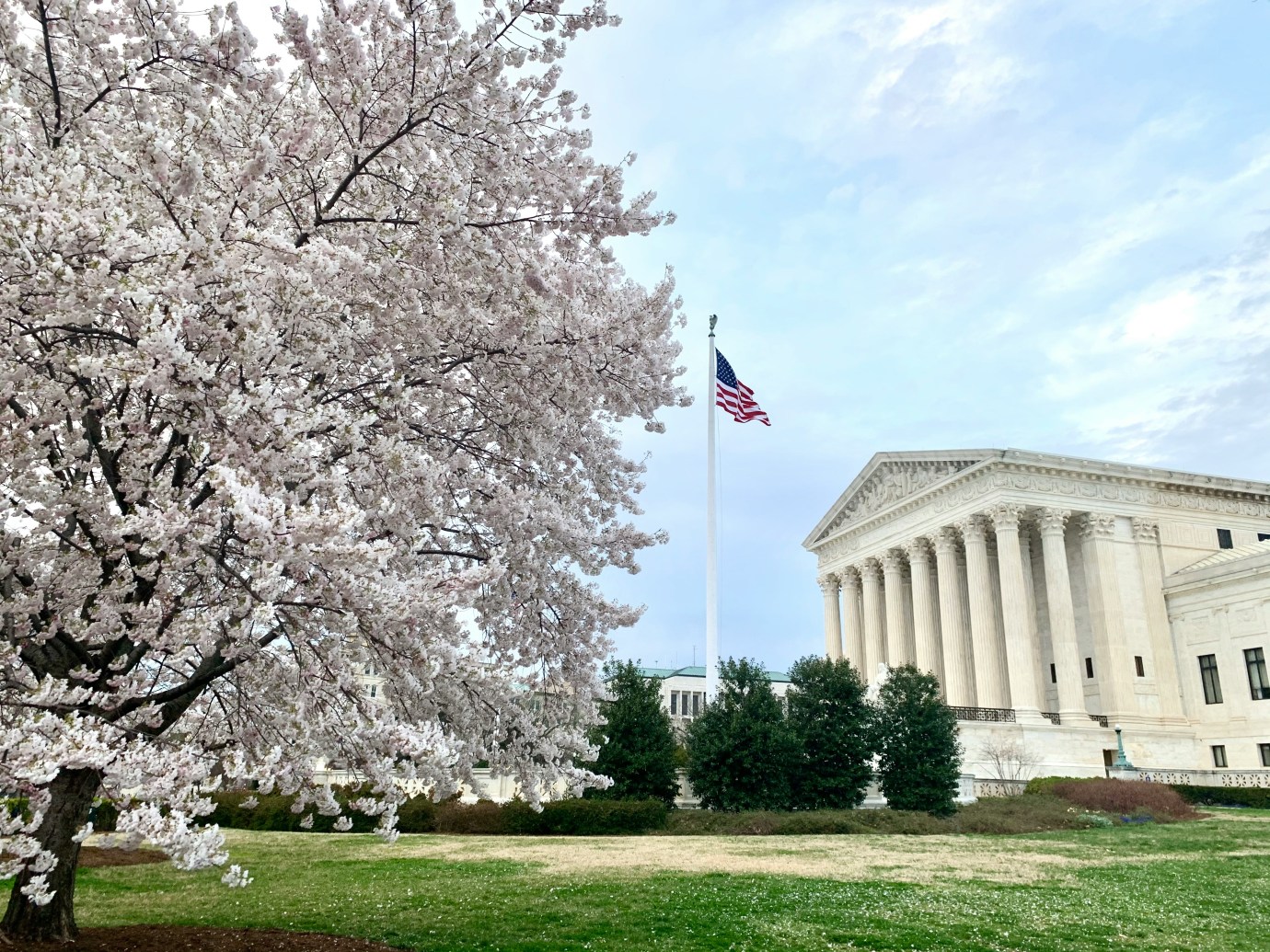Happy Wednesday! It turns out the driver who went viral last week for attending a court hearing about a suspended license via Zoom while actively driving actually had his suspension lifted by a judge back in 2022—but the order was never processed because apparently, no one told him he had to pay a fee to get it reinstated. Bureaucracy strikes again!
Quick Hits: Today’s Top Stories
- President Joe Biden issued an executive order on Tuesday that blocks migrants from seeking asylum at the southern border when the average number of daily crossings in a seven-day period reaches 2,500. Daily crossings in the last week have exceeded that threshold, so the suspension of asylum claims went into effect today. Under the order, asylum claims of people crossing between ports of entry would only be heard once the number of daily crossings fell below 1,500 for seven consecutive days. “The simple truth is, there is a worldwide migrant crisis, and if the United States doesn’t secure our border, there’s no limit to the number of people who may try to come here,” Biden said yesterday. “Frankly, I would have preferred to address this issue through bipartisan legislation. … But Republicans have left me with no choice.” House Speaker Mike Johnson decried Biden’s move as a “desperate political stunt to try and stabilize his plummeting poll numbers,” while the American Civil Liberties Union announced it intends to sue the Biden administration over the order.
- Hamas on Tuesday seemed to reject Biden’s three-part peace proposal, demanding that Israel first commit to a permanent ceasefire before the terror group makes any concessions. The office of Israeli Prime Minister Benjamin Netanyahu said on Saturday that “Israel’s conditions for ending the war have not changed: the destruction of Hamas military and governing capabilities, the freeing of all hostages and ensuring that Gaza no longer poses a threat to Israel.” The deal Biden outlined last week would have begun with a provisional ceasefire that would theoretically lead to a permanent cessation of hostilities after several phases of negotiations.
- Meanwhile, Biden delivered sharp criticism of Netanyahu in an interview with Time magazine conducted on May 28 but published on Tuesday. “I’m not going to comment on that,” Biden said when asked whether the Israeli prime minister was prolonging the war out of political self-interest. “There is every reason for people to draw that conclusion.” The president appeared to try to walk his comments back later on Tuesday when asked if Netanyahu was playing politics with the war. “I don’t think so,” he said. “He’s trying to work out a serious problem he has.”
- Early results from Tuesday’s vote in India’s general election showed Prime Minister Narendra Modi’s alliance winning more parliamentary seats than the opposition, enough to keep him in power. But Modi’s Bharatiya Janata Party (BJP) lost more seats than expected, leaving the prime minister with the narrowest parliamentary majority of his career and requiring him to rely on allied parties’ support to form a government. The BJP won 303 seats in the 2019 election but only 240 seats this time around. Modi’s broader coalition won a total of 293 seats—more than the 272 needed for a majority but far below the 400-seat supermajority Modi had predicted.
- New Jersey hotelier Curtis Bashaw defeated Christine Serrano Glassner—the mayor of Mendham who was endorsed by former President Donald Trump—in the Garden State’s Republican Senate primary on Tuesday. Bashaw will face off against Democratic Rep. Andy Kim and incumbent Sen. Robert Menendez—facing federal corruption charges and now running as an independent—in the general election in November. Menendez’s recent entry as an independent could put the usually safely Democratic New Jersey seat in play for the moderate Republican Bashaw. Meanwhile, despite being weighed down by his father’s indictment, Menendez’s son, Rep. Robert Menendez Jr., fended off a stiff primary challenge from Hoboken Mayor Ravi Bhalla.
Supreme Court Decisions To Watch This Summer

The nine justices of the Supreme Court agreed to hear 62 cases this term, which began in October. Decisions are released as the justices reach them, which typically means the most straightforward ones are out of the way quickly.
That also means that the more complicated and often controversial cases—the ones people like Sarah and David drool over—tend to be released during the first few weeks of summer. All the better to trigger mass protests in the sweltering D.C. heat.
The justices still have 32 decisions to release before its July recess, and several are poised to become lighting rods at a time when the court faces attacks from both sides of the political aisle. In the next month or so, the court could make landmark changes to the breadth of executive power (for both the president and the administrative state), the rules that govern the internet, and states’ ability to restrict access to abortifacient drugs, among other pressing questions.
Decision season has already begun. On May 30, the Supreme Court ruled unanimously that …
As a non-paying reader, you are receiving a truncated version of The Morning Dispatch. Our full 1,810-word story previewing upcoming Supreme Court decisions is available in the members-only version of TMD.
Worth Your Time
- Former Clinton administration Treasury Secretary Larry Summers caught a lot of flack in 2021 for warning Biden White House officials that their economic and monetary policies would exacerbate inflationary pressures. Ronald Brownstein interviewed Summers for his latest piece in the Atlantic. “Summers sees the risk of another price shock in the economic plans of former President Donald Trump,” Brownstein wrote. “‘There has never been a presidential platform so self-evidently inflationary as the one put forward by President Trump,’ Summers told me in an interview this week. ‘I have little doubt that with the Trump program, we will see a substantial acceleration in inflation, unless somehow we get a major recession first.’ Summers is far from alone in raising that alarm. Trump’s greatest asset in the 2024 campaign may be the widespread belief among voters that the cost of living was more affordable when he was president and would be so again if he’s reelected to a second term. But a growing number of economists and policy analysts are warning that Trump’s second-term agenda of sweeping tariffs, mass deportation of undocumented migrants, and enormous tax cuts would accelerate, rather than alleviate, inflation.”
- Writing for Law and Liberty, Andy Smarick explored the lessons about public leadership in the 2000 film Gladiator. The movie outlines “two competing visions of virtue in the public square,” Smarick wrote. “One—that of Marcus Aurelius—is about justice, judgment, self-control, and fortitude. … This model fosters personal attributes that enable us to think and act well on behalf of others. That is, it leads us to become better individuals who can then better contribute to society. In the film, Commodus knows he lacks these qualities, so he offers up his own strengths as a second, very different set of virtues: ambition, resourcefulness, loyalty, and a certain sort of courage. … At the core of his son’s system is selfishness not selflessness: Commodus’s principles are not public virtues; they are means to empower himself and his friends to do as they choose. The virtue of Marcus Aurelius only makes sense when the community believes in and is committed to a common good. … This sense of virtue fades fast, however, when we no longer embrace a common good. As we break into political or ideological teams and see those who disagree not as fellow citizens but as permanent opponents or enemies, concepts like accommodation, prudence, curiosity, forbearance, and integrity appear counterproductive.”
Presented Without Comment
New York Times: Louisiana Passes Surgical Castration Bill for Child Molesters
Also Presented Without Comment
GOP Rep. French Hill of Arkansas: “My record and history show that I have been a strong supporter of NATO. Today, I mistakenly voted in favor of an amendment to defund the NATO Security Investment Program. I have submitted a statement to the Congressional Record clarifying my vote and that I intended to vote NO on Roll Call No. 239.”
Also Also Presented Without Comment
Former GOP Rep. Ken Buck of Colorado, on The Daily Show:
“I left because I couldn’t tell the lie. [The] 2020 election wasn’t stolen. The January 6 defendants aren’t political prisoners. … There’s a lot of life out there besides arguing about nothing and telling lies, and so I made a choice to go enjoy what I’ve got left.”
In the Zeitgeist
Robert Downey Jr. and Jodie Foster sat down to discuss their decades in film, and Downey revealed that he’s become “surprisingly open-minded to the idea” of reprising his role as Iron Man. Makes sense to us, since that’s the part that jump-started his career.
Toeing the Company Line
- How can the courts restrain Title IX overreach? What’s ahead for Mexico after last weekend’s elections? Are Sen. Bob Menendez’s legal woes affecting his son’s congressional race? Sarah was joined by special guests David Super of Georgetown Law and Alison Somin of the Pacific Legal Foundation—as well as Grayson and Charles—to discuss all that and more on last night’s episode of Dispatch Live (🔒). Members who missed the conversation can catch a rerun—either video or audio-only—by clicking here.
- In the newsletters: Nick debated whether (🔒) Democrats would be well-served to lean into Trump’s felony conviction in their campaigning.
- On the podcasts: Jonah is joined on The Remnant by Nellie Bowles, a reporter with the Free Press, to discuss her new book, Morning After the Revolution: Dispatches from the Wrong Side of History.
- On the site: Drucker reports on his experience attending a Robert F. Kennedy Jr. rally in Colorado and Jonah explores why we really don’t know how Trump’s guilty verdict will affect the election.







Please note that we at The Dispatch hold ourselves, our work, and our commenters to a higher standard than other places on the internet. We welcome comments that foster genuine debate or discussion—including comments critical of us or our work—but responses that include ad hominem attacks on fellow Dispatch members or are intended to stoke fear and anger may be moderated.
With your membership, you only have the ability to comment on The Morning Dispatch articles. Consider upgrading to join the conversation everywhere.